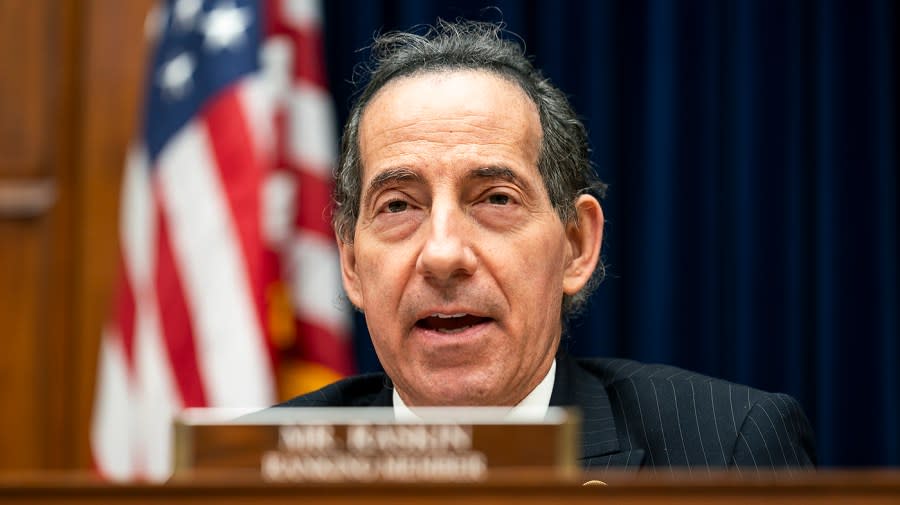Raskin targets Trump foreign payments with emoluments legislation

- Oops!Something went wrong.Please try again later.
Rep. Jamie Raskin (D-Md.) introduced legislation Tuesday to strengthen enforcement of the constitutional limitations on federal officials accepting payments from foreign governments, zeroing in on an issue that dogged the Trump presidency.
Raskin’s bill expands the reach of the so-called Emoluments Clause, restricting federal elected officials as well as some high-ranking appointees from accepting such payments while in office as well as for two years beyond.
The Constitution already directs the president and other officials to seek the permission of Congress before accepting any profit from foreign governments.
But that process was flouted by former President Trump, with House Oversight Democrats documenting nearly $8 million in income he received from 20 different countries via his various businesses.
Raskin, the top Democrat on the Oversight Committee, blasted Trump for taking the funds “without seeking, much less obtaining, the required consent of Congress.”
“Although we have not needed to develop a full-blown legislative machinery to enforce the Emoluments Clause for more than two centuries, Congress must now enact a law to prevent presidents from ever again exploiting the presidency for self-enrichment by selling out our government to foreign states,” he said in a statement.
He added that foreign governments “were seeking to obtain, and often got, specific policy favors from [Trump’s] White House.”
The legislation is being sponsored in the upper chamber by Sen. Richard Blumenthal (D-Conn.), saying Trump’s “brazen acceptance of illegal foreign payments and benefits showed the need for clear rules enforcing the Constitution’s preeminent anti-corruption provisions.”
By extending the prohibition on foreign government earnings for two years, the bill targets conduct from others in Trump’s orbit, including his son-in-law Jared Kushner.
Six months after leaving the White House, the Saudi government invested $2 billion with Kushner’s newly formed private equity fund.
Similarly, the legislation would apply the Emoluments prohibition to a number of White House staff like various assistants and counselors to the president. Kushner was a senior adviser to Trump.
The bill would also create both civil and criminal penalties for those who violate the law, meaning up to a year in jail time and $50,000 in fines for those convicted. Civil penalties are limited to $5,000 more than the “retail value” of the foreign payment.
Private citizens could also bring suits alleging violations of the law.
The legislation is the latest in the sparring between Democrats and Republicans over how to address money in politics.
Republicans have staged a multimonth investigation into Hunter Biden and other members of the Biden family as they accuse the family of “influence peddling.”
While Hunter Biden and his uncle both earned money in their overseas business dealings, they did so as private citizens, and GOP investigators have yet to connect their ventures with any actions taken by President Biden.
Still, the legislation puts no limitations on the business dealings of relatives of the president — something Republicans have argued needs to be a top focus.
The bill does, however, place new reporting requirements on the foreign income that officials are allowed to receive, requiring those earnings be detailed on their annual ethics disclosures.
Copyright 2024 Nexstar Media, Inc. All rights reserved. This material may not be published, broadcast, rewritten, or redistributed.
For the latest news, weather, sports, and streaming video, head to The Hill.

